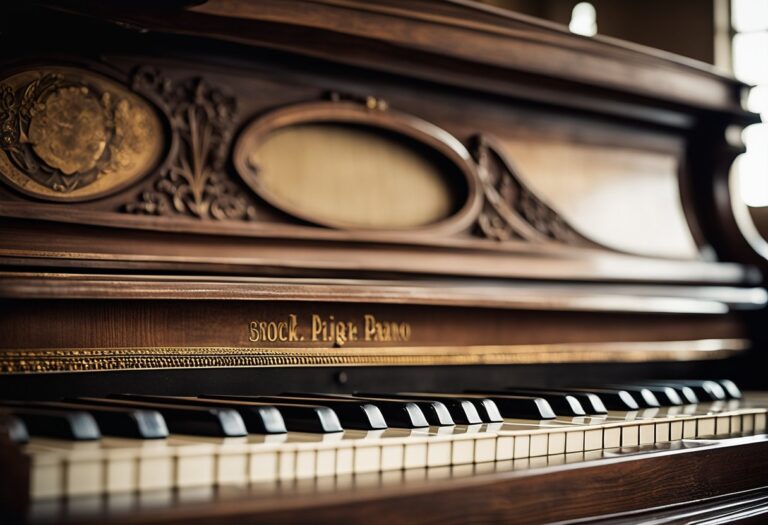The Enigmatic Connection: Decoding the Influence of Piano on IQ
Have you ever found yourself lost in the beautiful melodies of a piano, wondering if this magical instrument could also boost your intelligence? It’s a question that has intrigued many music lovers and scientists alike. As a seasoned pianist, you understand the physical and mental benefits of playing musical instruments. But does playing the piano increase your IQ? In this article, we’ll dive deep into the research to uncover the truth.
Numerous studies have explored the effects of playing the piano on cognitive function, with some suggesting a correlation between piano playing and increased IQ scores. However, the results have been mixed, leaving many unanswered questions. As a pianist, you know the importance of critical thinking and analysis, and we’ll take a closer look at the research to determine whether there is any merit to the claim that playing the piano can enhance your cognitive abilities.
While the idea of playing the piano to boost your IQ may sound tempting, it’s crucial to approach the topic with a critical eye. As we explore the mental and physical demands of playing this instrument, we’ll uncover whether these demands translate into improved cognitive function. So, join us on this journey of discovery as we unravel the mystery of whether playing the piano can truly make you smarter.
The Concept of IQ
When you talk about intelligence, you are referring to the ability to learn, understand, and apply knowledge and skills. Intelligence Quotient or IQ is a measure of this ability. It is a standardized test that assesses cognitive abilities such as problem-solving, reasoning, spatial perception, and memory.
IQ tests are designed to measure a person’s intellectual potential and are used to predict academic success or job performance. The average IQ score is 100, and scores above 130 are considered exceptional.
It is important to note that IQ is not the only measure of intelligence. Emotional intelligence, social intelligence, and practical intelligence are also important aspects of intelligence that are not measured by IQ tests.
IQ scores can be influenced by various factors such as genetics, environment, education, and culture. It is also important to note that IQ is not fixed and can be improved with training and education.
Intelligence is a complex and multifaceted concept that cannot be measured by a single test. IQ, while useful in predicting academic and job performance, is just one piece of the puzzle. It can be influenced by a variety of factors, such as education, environment, and genetics. So, while IQ is a valuable tool, it’s important to remember that it’s not the be-all and end-all of intelligence. There are many different ways to be smart, and each individual has their own unique set of abilities and strengths.
Correlation Between Piano Playing and IQ
Neurological Influence
Playing the piano requires the use of both hemispheres of the brain, which can increase the connectivity between them. This increased connectivity can lead to improved cognitive abilities, including increased memory, spatial reasoning, and problem-solving skills. A study published in the Journal of Neuroscience found that piano training can increase the grey matter in the brain, which is associated with higher IQ scores.
Cognitive Impact
Learning to play the piano involves memorizing notes, rhythms, and finger movements, which can improve your working memory. This can lead to better retention of information and improved cognitive processing speed. Additionally, playing the piano can improve your ability to focus and concentrate, which can have a positive impact on overall cognitive function.
Emotional and Social Effects
Playing the piano can also have emotional and social benefits. It can be a stress reliever and provide a sense of accomplishment and self-esteem. Additionally, playing the piano can be a social activity, allowing you to connect with others through music. These emotional and social benefits can have a positive impact on overall well-being.
| Pros | Cons |
| Increased connectivity between brain hemispheres | Requires time and dedication |
| Improved cognitive abilities | Can be expensive |
| Better retention of information | Can be frustrating |
| Improved ability to focus and concentrate | Requires access to a piano |
| Emotional and social benefits |
The benefits of playing the piano go far beyond just hitting the right notes. While there is evidence to suggest that piano playing can positively impact IQ and cognitive function, it’s important to remember that correlation does not necessarily equal causation. Other factors, such as motivation and discipline, may also be at play. That being said, learning to play the piano can provide a wealth of benefits, from improving fine motor skills to boosting creativity and reducing stress. So, whether you’re a seasoned pianist or just starting out, there’s no denying the power of this timeless instrument.
Scientific Studies
Research has been conducted to explore the relationship between playing the piano and increasing IQ. Here are some of the key studies:
- A study published in the journal Psychology of Music found that children who received piano lessons had significantly higher IQ scores than those who did not. The study followed 144 children over a three-year period and found that those who received piano lessons showed an average increase of 7 points in their IQ scores compared to those who did not receive lessons.
- Another study published in the journal Intelligence found that adults who had received piano lessons as children had higher verbal ability and cognitive flexibility compared to those who had not received lessons. The study followed 45 adults and found that those who had received piano lessons scored higher on tests of verbal ability and cognitive flexibility.
- A study published in the journal PLOS ONE found that children who received piano lessons had increased grey matter volume in areas of the brain associated with attention, working memory, and executive function. The study followed 36 children over a six-month period and found that those who received piano lessons showed an increase in grey matter volume compared to those who did not receive lessons.
These studies suggest that playing the piano may have a positive impact on IQ and cognitive abilities. However, it is important to note that these studies have limitations and further research is needed to fully understand the relationship between playing the piano and IQ.
Critiques and Counterarguements
When it comes to the relationship between playing the piano and IQ, there are some critiques and counterarguments that need to be addressed.
Firstly, some argue that the correlation between piano playing and IQ is not necessarily causal. In other words, just because there is a correlation between the two does not mean that playing the piano actually causes an increase in IQ. People who are naturally more intelligent may be simply more likely to take up piano playing as a hobby.
Furthermore, it is important to note that other activities have been shown to increase IQ as well, such as playing chess or learning a new language. Therefore, it is possible that any cognitive benefits associated with piano playing are not unique to that activity alone.
While some studies have found a positive correlation between piano playing and IQ, other studies have failed to find any significant relationship between the two. This inconsistency in research findings raises questions about the validity of the claims that playing the piano can increase IQ.
Lastly, it is important to consider that IQ is not the only measure of intelligence. There are many different types of intelligence, such as emotional intelligence and creative intelligence, that are not necessarily related to playing the piano. Therefore, it is possible that piano playing may only have a limited impact on overall intelligence.
Overall, while there is some evidence to suggest that playing the piano may be associated with increased IQ, it is important to be cautious in making any definitive claims. Further research is needed to fully understand the relationship between piano playing and cognitive abilities.
Conclusion
While the evidence suggests that playing the piano can have a positive effect on cognitive abilities, particularly in spatial-temporal reasoning and memory, it’s important to remember that IQ is a complex construct influenced by many factors. The studies conducted on this topic have been relatively small and focused on specific populations, making it difficult to draw broad conclusions about the impact of piano playing on IQ.
Moreover, genetics, environment, and education are just a few of the many factors that contribute to IQ. While playing the piano may be one activity that can potentially contribute to cognitive development, it’s not a magic solution that guarantees higher IQ scores.
So, if you’re passionate about playing the piano, keep at it! It’s a wonderful hobby that offers many benefits beyond just cognitive development. However, if you’re specifically looking to increase your IQ, it’s important to consider all the factors and not rely solely on piano playing. In the end, the pursuit of knowledge and personal growth is a lifelong journey that requires a multifaceted approach.
Frequently Asked Questions
How does playing a musical instrument affect cognitive abilities?
Playing a musical instrument has been shown to enhance cognitive abilities in various ways. For example, it can improve memory, attention, and language skills. It also helps develop fine motor skills and hand-eye coordination, which can have positive effects on other areas of life.
Is there a correlation between musical ability and IQ?
Research has shown a positive correlation between musical ability and IQ. However, it is important to note that correlation does not necessarily mean causation. It could be that individuals with higher IQs are more likely to take up musical instruments or that playing an instrument enhances cognitive abilities.
What research has been done on the relationship between playing an instrument and IQ?
There have been numerous studies conducted on the relationship between playing an instrument and IQ. Some studies have found a positive correlation between the two, while others have found no significant relationship. The research is still ongoing, and more studies are needed to fully understand the relationship.
Can playing the piano improve cognitive function?
Playing the piano can improve cognitive function in various ways. It can enhance memory, attention, and language skills. It also helps develop fine motor skills and hand-eye coordination, which can have positive effects on other areas of life.
Do musicians have higher IQs than non-musicians?
Studies have shown that musicians tend to have slightly higher IQs than non-musicians. However, it is important to note that this does not mean that playing an instrument causes an increase in IQ. It could be that individuals with higher IQs are more likely to take up musical instruments.
Are there any studies that show a link between playing the piano and increased intelligence?
There have been studies that suggest a link between playing the piano and increased intelligence. However, more research is needed to fully understand the relationship between the two. It is important to note that playing the piano is just one of many activities that can enhance cognitive abilities.






